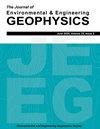Ground Penetrating Radar Attenuation Expressions in Shallow Groundwater Research
IF 0.7
4区 工程技术
Q4 ENGINEERING, GEOLOGICAL
引用次数: 1
Abstract
The electromagnetic-wave attenuation coefficient determines the overall resolution and effective penetration depth of ground penetrating radar (GPR) surveys. Despite this relevance to the design of proper GPR surveys, the attenuation expressions are rarely used in the applied shallow groundwater research (SGR) literature. This work examines the status of the attenuation expressions in SGR. For this, 73 GPR case studies (in 47 papers), including some information concerning the attenuation variables and parameters, were selected to build a database. From these, 18 cases (in 10 papers) provided attenuation expressions and only 11 cases (in 4 papers) used those expressions. Two types of expressions were identified, physically based global ones that try to solve a broad (but not complete) range of environmental and field technical conditions, and non-global ones adapted for specific geological environments and resolution needed. The database analysis showed that both global and non-global expressions were used exclusively in low-loss media to report an attenuation range of 0.1–21.5 dB m−1 by using common antenna frequencies in the 25–900 MHz range. The range of the attenuation expressions validity in SGR is biased because no surveys in variable-loss heterogeneous media and wider antenna frequency intervals could be compiled. The attenuation database generated seeks to improve the design of GPR surveys in SGR.浅层地下水探地雷达衰减表达式研究
电磁波衰减系数决定了探地雷达探测的总分辨率和有效探深。尽管衰减表达式与合理的探地雷达测量设计相关,但在应用浅层地下水研究(SGR)文献中很少使用衰减表达式。本文研究了SGR中衰减表达式的现状。为此,选取了73个GPR案例研究(47篇论文),包括一些有关衰减变量和参数的信息,建立数据库。其中,18例(10篇论文)提供了衰减表达式,只有11例(4篇论文)使用了衰减表达式。确定了两种类型的表达,一种是基于物理的全球表达,试图解决广泛(但不完整)的环境和现场技术条件,另一种是非全球表达,适用于特定的地质环境和所需的分辨率。数据库分析表明,使用25-900 MHz范围内的公共天线频率,在低损耗介质中只使用全局和非全局表达式,报告的衰减范围为0.1-21.5 dB m−1。由于无法编制变损耗非均匀介质和较宽天线频率间隔的调查,SGR中衰减表达式的有效性范围存在偏差。生成的衰减数据库旨在改进SGR中探地雷达调查的设计。
本文章由计算机程序翻译,如有差异,请以英文原文为准。
求助全文
约1分钟内获得全文
求助全文
来源期刊

Journal of Environmental and Engineering Geophysics
地学-地球化学与地球物理
CiteScore
2.70
自引率
0.00%
发文量
13
审稿时长
6 months
期刊介绍:
The JEEG (ISSN 1083-1363) is the peer-reviewed journal of the Environmental and Engineering Geophysical Society (EEGS). JEEG welcomes manuscripts on new developments in near-surface geophysics applied to environmental, engineering, and mining issues, as well as novel near-surface geophysics case histories and descriptions of new hardware aimed at the near-surface geophysics community.
 求助内容:
求助内容: 应助结果提醒方式:
应助结果提醒方式:


